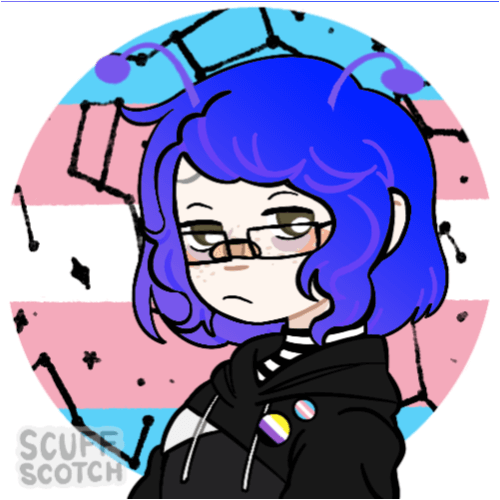What is a Switch?
Switching refers to one Alter or Part taking control of the body from another Part. Generally Switches are grouped into three categories; consensual, forced and triggered.
Consensual Switches
Consensual switching is when two or more Parts mostly agree before a switch occurs. An example of consensual switching is sometimes called "planned switching." This type of switching can happen when two or more Parts plan on switching in the future, usually to achieve a specific task. For example, in our System we often plan switches with Katie around social situations. Katie is the most social Part of our System and a Protector, so she handles these situations best.
Forced Switches
Switches can also occur without all of the Parts consent, this is called a forced switch. Many tend to associate forced switches as one Alter forcefully removing another from the front, but that is not always the case! Consider if an Alter is fronting and suddenly leaves the front due to stress or a trigger. Someone has to front to prevent injury or embarrassment to the body, so another Part is forced to the front. This type of switch can also be referring to a Part forcibly removing another from the front.
Triggered Switches
Important: Some people use trigger/triggered switch to only refer to negative experiences that cause dissociation or switching. Others will use the same terms to label both positive and negative experiences. In our writing we explicitly label triggers as positive/negative. When discussing with others take care to word things kindly!
Triggered switches occur as a response to a strong emotional reaction. Triggered switches are not planned or wanted by the System.
Negative Trigger Example:
If a System is confronted with the possibility of abuse or violence, a Protector Part could be triggered to protect or absorb the abuse.
Positive Trigger Example:
If a System is at a shopping center and they walk by a store with a Little Parts favorite shows merchandise on display. Seeing that could cause the Little to excitedly rush to the front.
Important: If someone shares their trigger, or you discover one, please be mindful to respect the Systems autonomy. Do not use triggers to force a switch unless you have all of the Alters permission before doing so.
What does a Switch look like?
Some media representations show switching as a violent process, which is not true. Switching can be entirely covert and can go unnoticed from the outside. More often Switching is accompanied by very subtle indications. Some react to a switch with disorientation, suddenly being put at the front can feel very confusing, especially if it is forced. Sometimes switches can cause mild headaches or heavy and "spaced out" blinking.
More immediately noticeably, some switches may cause the person to adjust major aspects of their person. They may adjust their posture and clothing. Not all Parts like sitting the same way for example. They may clear their throat and have a noticeable pitch change in voice. Vocabulary and styles of speaking also often change. Switches may also affect the persons skills and skill level. Some Alters can be more proficient in a skill or hobby than other Parts! Changes of preference in food, clothing, and recreational activities can be another indicator.
We have heard of cases in which switching can also cause mild muscle spasms, twitches, or jerking. We have not personally experienced this, but the sources we have seen appear credible.
How long do Switches take?
Switches can occur quickly and slowly. Quick switches can happen within just a few seconds or minutes. Slower switches can take minutes to hours to stop.
Often positive/negative triggers and forced switches will result in immediate fast switches. Triggers and forced switches need to be handled carefully though! Switching can take a lot of energy and be disorienting. Having too many triggers can result in Rapid Cycling, or rapidly switching between Alters. Not only can is this highly disorienting for all Alters but it also disrupts memory formation, short term memory and concentration.
In our experience, slow switches often coincide with heavy depersonalization and dissociation. We are unsure if the long switching causes the depersonalization, or external stress causes the depersonalization which in turn causes long switching periods. We are by no means saying that dp/dissociation is directly linked to long switching. In our personal case the two seem to be a possible indicator for the other.
How often do Switches Occur?
As you may have inferred from the rest of this post, how often switching occurs can vary widely. More stressful days will generally cause more switches to help cope with that stress. Likewise eventful days, even positive events, can also cause switches due to positive triggers.
It is important to keep in mind there is no baseline for switching. Some Systems have reported going days, weeks, and months without experiencing a switch.
Other Terms
The Front / Fronting
Systems will often use the term "The Front" to indicate how aware an Alter is in relation to the eternal world. For example, one could say "I haven't seen Aster today, they haven't been near the front." This would indicate that the Alter Aster, has been mostly "inside" and has not tried to interact with the external world.
"Fronting" is a term that is derived from The Front. It would indicate what Alter is currently handling the bodies interactions with the external world. For example we could say, "We were very quiet today because Viv was fronting and is Non-Verbal."
Co-Fronting / Co-Conscious
It is possible for two Parts to be at the front at once. Different Alters will often pass control various body parts around to achieve a joint goal.
In our experience Katie and Aster often co-front together to work on programming tasks. We will pass control of the hands and eyes back and forth. Most useful, we are able to discuss our ideas internally to brainstorm and workout problems.
Front Stuck
If an Alter is at the front and unable to leave the Alter may consider themself "Front Stuck." This can happen due to a forced switch, a trigger, or just stress. To our knowledge the only solution is to just wait the front stuck out.
Switchy
A feeling that many Systems experience. It describes feeling like an Alter is close to switching but is not. It can also mean feeling an Alter is trying to force a switch.



